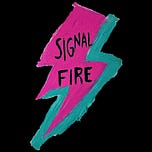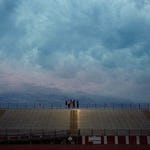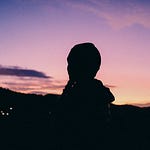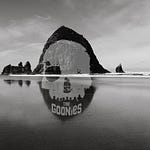I am a man of wonder, filled to the roof of me, bursting from the chimney, exploding out into the dark night air, filling all that black with glow. I am a man of awe, saturated in it really, soaked like showered in it, and the more I learn, the deeper it sinks, the further it spreads.
I think often of time, of those that we were before it was recorded, before we knew the shapes to draw to speak the words we were building in our mouths, before we could construct poetry from them, before hours had a name. I think of simpler species staring up at similar skies, hiding in caverns or forests from the explosions of light during storm, of the triumphant booms that rattled the bones beneath their skin. I think of the wonder there, the terror in the unknown apocalypse happening each time it rained. I think of the fury they must have feared, the power to ignite the landscape in flame and smoke, to kill those it struck. I think of that awe.
I think of us now, more learned than ever before, more educated on the molecular machinations of what we once called magic, and I ask myself if science has stolen the sting from the ethereal. I write of this often, and I even have an idea for a new book of poetry based entirely around this, pondering on whether or not understanding the explanations behind things robs us of the wonder of them. I oscillate here, truth told, but when it all settles and the silence finds me as it always does, I land on the same opinion:
No. Science has not stolen our wonder, but amplified it.
I shall double down here, and do my best to explain, as it’s all I can offer. For centuries, scholars entrenched in their religious beliefs believed that nothing had the power to take away god, or capital G God to them, like science. To strip away the awe, the wide-eyed wonder from the all-powerful creator of heaven and hell and all things between, was to peel away her power, and with power goes legitimacy, not only of god herself, but of those that built their lives and their own personal legitimacy around her. *A brief aside, I believe, and will always refer to whatever helped create all things as a her, because I believe, and will always believe, some dude could have never done so…I kid, but really.*
As I’ve wandered down the path of writing all these poems based on scientific discoveries, fascinating facts, strange species-based behaviors, and exploration of everything from deep space to deep sea to the depths of DNA, all I’ve found is that my wonder has grown exponentially, that my awe has accompanied it. Instead of losing the mouth-agape shock for the beautiful and bizarre happenings all around me, I find myself further baffled when I dive into the actual events taking place. I read facts about how if one were to remove ALL the empty space between the atoms of every human being on earth, we’d all fit inside an apple, and I cannot help but feel simultaneously very small, and very alive. We are specks of stardust, confirmed across experimentation and hypothesis, we are walking proof of science being so much more than magic.
I spoke a bit back about the scene in Joe vs. the Volcano when Joe, near death, speaks up to the moon and says “Dear god, whose name I do not know, thank you for my life,” and I think of this often. Whose name I do not know. I’ve long believed if we had some beautiful way to strip out all the empty spaces between all the different religions and belief systems on this silly planet, all the fluff that doesn’t truly matter, and got to the nucleus of it all, the heart of truth beating at the center around which all things spin, we’d all be saying the same things, we’d all be feeling the same things, and those things would be wonder, they would be awe, they would be breathless appreciation for what we cannot explain, or even understand once told the explanation behind it. We just don’t call it the same thing.
How much time, how much life, lost in the arguing over the semantics of our astonishment? How much death called forth, masquerading as an order passed down from a force on high, all for decorating the very same wonderment in different colors, speaking of it in a different dialect. We all sound foreign to one another, but that doesn’t mean we’re on a different page. I’ll close with a poem I wrote, about precisely this wonder, this awe, this jaw-dropped jubilation, and how the more I’ve learned, the stronger it’s gotten. I think science has come to give us our wonder back, to introduce worlds we could not possibly imagine, above us, below us, within us.
We are still the same species that hid in caves and waited for the rumbling to slow, that covered our eyes to the lightning that cracked through the midnight sky, we still blame what we cannot explain on something bigger, something scarier, and I don’t think it matters what we call it. I hope you love the poem, I hope you look around you and feel nothing but stunned. I hope.
Trembled once, huddled and braced, stone walls weeping with midnight moisture, wrath of gods, said we infants with infant fears, children on the timeline of things. Fury we called it, punishment for our mortal failings, lightning like arrows thrown earthward thunder like roar, like hammers on anvils, shaping bolts to illuminate the awe in our faces. Air is an insulator, we learn, barrier between charges, positive and negative, and one day the differences between the two build to a breaking (as all things must break) and must release. Still we tremble, backs to walls of wood, away from the windows we stare through. Still the fear, toddlers with toddler fright, but now we know, understand the math of it. Science has come not to steal our wonder. but to give it back. -Tyler Knott Gregson-
Maybe god is there
in the space between atoms,
the science of stars.














